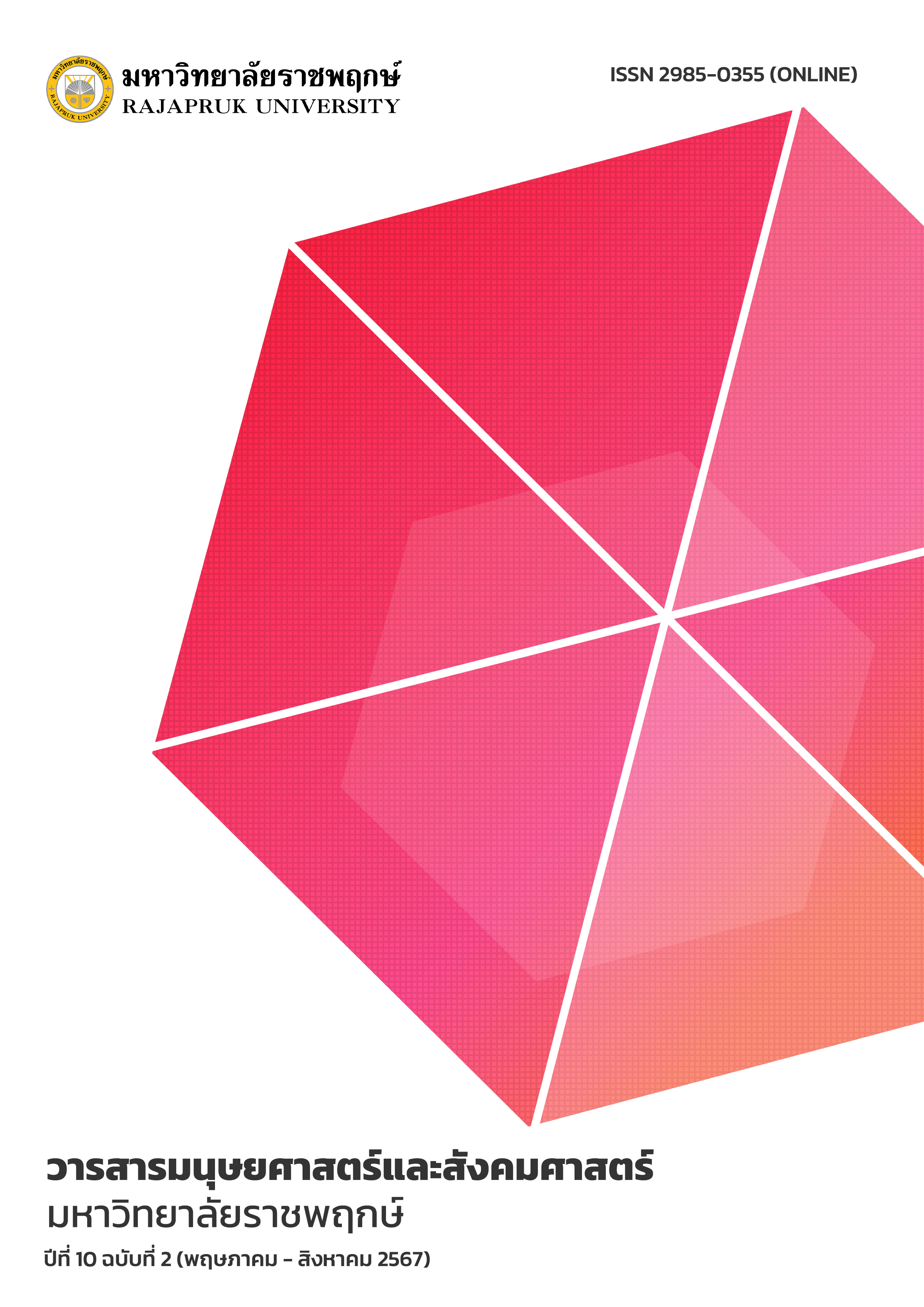กระบวนการตัดสินใจของประชาชนในการลงคะแนนเสียงเลือกตั้งผู้ว่าราชการกรุงเทพมหานคร วันที่ 22 พฤษภาคม พ.ศ. 2565
Main Article Content
บทคัดย่อ
บทคัดย่อ
การวิจัยนี้มีวัตถุประสงค์ เพื่อ 1) เปรียบเทียบกระบวนการตัดสินใจของประชาชนในการลงคะแนนเสียงเลือกตั้งผู้ว่าราชการกรุงเทพมหานคร วันที่ 22 พฤษภาคม พ.ศ. 2565 และ 2) ศึกษาปัจจัยทางการเมือง ส่งผลต่อกระบวนการตัดสินใจของประชาชนในการลงคะแนนเสียงเลือกตั้งผู้ว่าราชการกรุงเทพมหานคร วันที่ 22 พฤษภาคม พ.ศ. 2565 การวิจัยเชิงปริมาณนี้ทำการเก็บข้อมูลจากประชาชนที่มีอายุ 18 ปีขึ้นไป ที่อาศัยอยู่ในเขตกรุงเทพมหานคร จำนวน 384 คน โดยใช้แบบสอบถามเป็นเครื่องมือในการเก็บข้อมูล สถิติที่ใช้ในการวิเคราะห์ข้อมูลประกอบด้วยความถี่ ร้อยละ ค่าเฉลี่ย ส่วนเบี่ยงเบนมาตรฐาน สถิติทดสอบที การวิเคราะห์ความแปรปรวนทางเดียว และการถดถอยเชิงเส้นแบบพหุคูณ
ผลการวิจัยพบว่า 1) ประชาชนที่มีระดับการศึกษา และมีรายได้เฉลี่ยต่อเดือนต่างกัน มีกระบวนการตัดสินใจในการลงคะแนนเสียงเลือกตั้งผู้ว่าราชการกรุงเทพมหานครแตกต่างกัน ส่วนประชาชนที่มีเพศ อายุ และอาชีพ ต่างกัน มีกระบวนการตัดสินใจในการลงคะแนนเสียงเลือกตั้งผู้ว่าราชการกรุงเทพมหานคร ไม่แตกต่างกัน และ 2) ปัจจัยทางการเมือง ได้แก่ ด้านการหาเสียง ด้านผลประโยชน์หรือผลตอบแทน ด้านนโยบายของผู้สมัคร ด้านความสัมพันธ์ส่วนตัว และด้านพรรคการเมือง ส่งผลต่อกระบวนการตัดสินใจของประชาชนในการลงคะแนนเสียงเลือกตั้งผู้ว่าราชการกรุงเทพมหานคร อย่างมีนัยสำคัญทางสถิติที่ระดับ .01 และสามารถทำนายกระบวนการตัดสินใจของประชาชนในการลงคะแนนเสียงเลือกตั้งผู้ว่าราชการกรุงเทพมหานคร ได้ร้อยละ 27.2
สมการพยากรณ์กระบวนการตัดสินใจของประชาชนในการลงคะแนนเสียงเลือกตั้งผู้ว่าราชการกรุงเทพมหานคร ในรูปแบบคะแนนมาตรฐาน มีดังนี้
Z = ß1ZX1 + ß 4ZX4 + ß 5ZX5 + ß 6ZX6 + ß 7ZX7
= 0.135 ZX1 + 0.199 ZX4 + 0.206 ZX5 + 0.158 ZX6 + 0.270 ZX7
Article Details
เอกสารอ้างอิง
กรมการปกครอง. (2565). สถิติประชากร รายจังหวัด. ค้นเมื่อวันที่ 25 สิงหาคม 2565, จาก https://stat.bora.dopa.go.th/StatMIS/#/ReportStat/
กัลยา วานิชย์บัญชา. (2542). การวิเคราะห์สถิติ: สถิติเพื่อการตัดสินใจ. พิมพ์ครั้งที่ 4. กรุงเทพฯ: โรงพิมพ์แห่งจุฬาลงกรณ์มหาวิทยาลัย.
ไกรลาส พลไชย. (2561). ปัจจัยที่มีผลต่อการตัดสินใจของประชาชนในการเลือกตั้งนายกองค์การบริหารส่วนตำบลดงมะไฟ อำเภอเมืองสกลนคร จังหวัดสกลนคร. วิทยานิพนธ์รัฐประศาสนศาสตรมหาบัณฑิต สาขาวิชารัฐประศาสนศาสตร์ มหาวิทยาลัยราชภัฏสกลนคร.
จุฬีวรรณ เติมผล. (2561). เยาวชนกับการมีส่วนร่วมพัฒนาประชาธิปไตย. กรุงเทพฯ: สำนักการพิมพ์สำนักงานเลขาธิการสภาผู้แทนราษฎร.
ชัยพจน์ จำเริญนิติพงศ์. (2557). ปัจจัยที่มีผลต่อการตัดสินใจเลือกสมาชิกสภาผู้แทนราษฎรของประชาชนในเขตเลือกตั้งที่ 1 จังหวัดชลบุรี. วิทยานิพนธ์รัฐประศาสนศาสตรมหาบัณฑิต สาขาวิชารัฐประศาสนศาสตร์ มหาวิทยาลัยราชภัฏรำไพพรรณี.
ถิรวุฒิ เหมือนแก้ว. (2561). อิทธิพลของหัวคะแนนที่มีผลต่อการเลือกตั้งสมาชิกสภาผู้แทนราษฎร จังหวัดนครศรีธรรมราช พ.ศ. 2554. วิทยานิพนธ์รัฐศาสตรมหาบัณฑิต สาขาวิชาการเมืองการปกครอง มหาวิทยาลัยรังสิต.
พิชญ์ พงษ์สวัสดิ์. (2565). ก่อนจะถึงการเลือกตั้งผู้ว่าราชการกรุงเทพมหานครและสมาชิกสภากรุงเทพมหานคร พ.ศ. 2565: การเลือกและประเด็นปัญหาท้าทายของการพัฒนากรุงเทพมหานครจากอดีตถึงปัจจุบัน. กรุงเทพฯ: สถาบันพระปกเกล้า.
ไพบูลย์ บุตรเลียบ. (2556). ปัจจัยที่มีผลต่อการตัดสินใจเลือกตั้งสมาชิกสภาผู้แทนราษฎรของจังหวัดสมุทรสาคร: ศึกษาในห้วงเวลาปี 2557. วิทยานิพนธ์รัฐศาสตรมหาบัณฑิต สาขาวิชาการสื่อสารการเมือง วิทยาลัยสื่อสารการเมือง มหาวิทยาลัยเกริก.
มงคล รัตนพันธ์ และคณะ. (2554). ปัจจัยที่ใช้ในการตัดสินใจเลือกตั้งสมาชิกสภาผู้แทนราษฎร: ศึกษากรณีผู้มีสิทธิ์เลือกตั้งในเขตเลือกตั้งที่ 3 จังหวัดประจบคีรีขันธ์. วิทยานิพนธ์รัฐศาสตรมหาบัณฑิต สาขาวิชาการสื่อสารการเมือง วิทยาลัยสื่อสารการเมือง มหาวิทยาลัยเกริก.
สวิตตา สุวรรณเนตร และสมปอง ผลเจริญจิต. (2554). ปัจจัยที่มีผลต่อการตัดสินใจเลือกตั้งสมาชิกสภาผู้แทนราษฎร: ศึกษากรณีประชาชนผู้มีสิทธิ์เลือกตั้งจังหวัดเชียงใหม่. วิทยานิพนธ์รัฐศาสตรมหาบัณฑิต สาขาวิชาการสื่อสารการเมือง วิทยาลัยสื่อสารการเมือง มหาวิทยาลัยเกริก.
จรัส สุวรรณมาลา และคณะ. (2557). แผนพัฒนากรุงเทพมหานคร ระยะ 20 ปี (พ.ศ. 2556-2575). กรุงเทพฯ: สำนักยุทธศาสตร์และการประเมิน กรุงเทพมหานคร.
สุรศักดิ์ ตรีรัตน์ตระกูล. (2559). การคุ้มครองสิทธิมนุษยชนของเหยื่อหรือผู้เสียหายโดยกระบวนการยุติธรรม. รายงานเอกสารส่วนบุคคล วิทยาลัยรัฐธรรมนูญ สำนักงาน ศาลรัฐธรรมนูญ.
สุทิน ชนะบุญ. (2560). การวิเคราะห์ข้อมูลเชิงอนุมาน: สถิติและการวิเคราะห์ข้อมูลในงานวิจัยเชิงคุณภาพเบื้องต้น. ขอนแก่น: สำนักงานสาธารณสุขจังหวัดขอนแก่น.
สุวิมล ติรกานันท์. (2550). ระเบียบวิธีวิจัยทางสังคมศาสตร์: แนวทางปฏิบัติ. กรุงเทพฯ: โรงพิมพ์แห่งจุฬาลงกรณ์มหาวิทยาลัย.
Cronbach, L.J. (1990). Essentials of psychological testing. 5th ed. New York: Harper Collins.
Fraenkel, R.J. & Wallen, E.N. (2006). How to design and evaluate research in education. 6th ed. Boston: McGraw-Hill.
Jacobs, L.C. (1991). Test Reliability. IU Blomington Evaluation Services and Testing (Best). Blomington: Indiana University.
Krejcie, R.V., & Morgan, D.W. (1970). Determining Sample Size for Research Activities. Educational and Psychological Measurement, 30(3), 607-610.
Macridis, R.C., & Brown, E.B. (1965). Comparative politics: Notes and Reading. Homewood: Dorsey Press.
Schumpeter, J. (1962). Capitalism, Socialism and Democracy. 3rd ed. New York: Harper Torchbooks.


